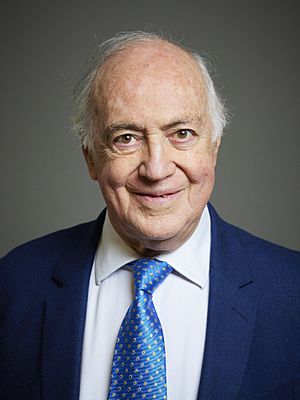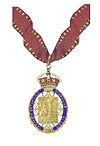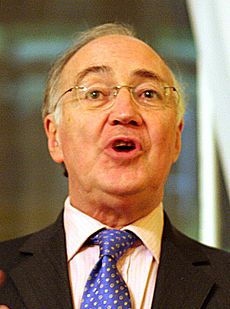Michael Howard facts for kids
Quick facts for kids
The Lord Howard of Lympne
|
|||||||||||||||||||||||||||||||||||||||||||||
|---|---|---|---|---|---|---|---|---|---|---|---|---|---|---|---|---|---|---|---|---|---|---|---|---|---|---|---|---|---|---|---|---|---|---|---|---|---|---|---|---|---|---|---|---|---|

Official portrait, 2023
|
|||||||||||||||||||||||||||||||||||||||||||||
| Leader of the Opposition | |||||||||||||||||||||||||||||||||||||||||||||
| In office 6 November 2003 – 6 December 2005 |
|||||||||||||||||||||||||||||||||||||||||||||
| Monarch | Elizabeth II | ||||||||||||||||||||||||||||||||||||||||||||
| Prime Minister | Tony Blair | ||||||||||||||||||||||||||||||||||||||||||||
| Preceded by | Iain Duncan Smith | ||||||||||||||||||||||||||||||||||||||||||||
| Succeeded by | David Cameron | ||||||||||||||||||||||||||||||||||||||||||||
| Leader of the Conservative Party | |||||||||||||||||||||||||||||||||||||||||||||
| In office 6 November 2003 – 6 December 2005 |
|||||||||||||||||||||||||||||||||||||||||||||
| Deputy | Michael Ancram | ||||||||||||||||||||||||||||||||||||||||||||
| Preceded by | Iain Duncan Smith | ||||||||||||||||||||||||||||||||||||||||||||
| Succeeded by | David Cameron | ||||||||||||||||||||||||||||||||||||||||||||
| Home Secretary | |||||||||||||||||||||||||||||||||||||||||||||
| In office 27 May 1993 – 2 May 1997 |
|||||||||||||||||||||||||||||||||||||||||||||
| Prime Minister | John Major | ||||||||||||||||||||||||||||||||||||||||||||
| Preceded by | Kenneth Clarke | ||||||||||||||||||||||||||||||||||||||||||||
| Succeeded by | Jack Straw | ||||||||||||||||||||||||||||||||||||||||||||
| Secretary of State for the Environment | |||||||||||||||||||||||||||||||||||||||||||||
| In office 11 April 1992 – 27 May 1993 |
|||||||||||||||||||||||||||||||||||||||||||||
| Prime Minister | John Major | ||||||||||||||||||||||||||||||||||||||||||||
| Preceded by | Michael Heseltine | ||||||||||||||||||||||||||||||||||||||||||||
| Succeeded by | John Gummer | ||||||||||||||||||||||||||||||||||||||||||||
| Secretary of State for Employment | |||||||||||||||||||||||||||||||||||||||||||||
| In office 3 January 1990 – 11 April 1992 |
|||||||||||||||||||||||||||||||||||||||||||||
| Prime Minister | Margaret Thatcher John Major |
||||||||||||||||||||||||||||||||||||||||||||
| Preceded by | Norman Fowler | ||||||||||||||||||||||||||||||||||||||||||||
| Succeeded by | Gillian Shephard | ||||||||||||||||||||||||||||||||||||||||||||
|
|||||||||||||||||||||||||||||||||||||||||||||
|
|||||||||||||||||||||||||||||||||||||||||||||
|
|||||||||||||||||||||||||||||||||||||||||||||
| Personal details | |||||||||||||||||||||||||||||||||||||||||||||
| Born |
Michael Hecht
7 July 1941 Gorseinon, Swansea, Wales |
||||||||||||||||||||||||||||||||||||||||||||
| Political party | Conservative | ||||||||||||||||||||||||||||||||||||||||||||
| Other political affiliations |
Labour (1961) | ||||||||||||||||||||||||||||||||||||||||||||
| Spouse |
Sandra Paul
(m. 1975) |
||||||||||||||||||||||||||||||||||||||||||||
| Children | 2 | ||||||||||||||||||||||||||||||||||||||||||||
| Alma mater | Peterhouse, Cambridge (MA, LLB) Inns of Court School of Law |
||||||||||||||||||||||||||||||||||||||||||||
| n.b. | |||||||||||||||||||||||||||||||||||||||||||||
Michael Howard, Baron Howard of Lympne (born Michael Hecht on 7 July 1941) is a British politician. He was the Leader of the Conservative Party and Leader of the Opposition from 2003 to 2005. The Leader of the Opposition is the head of the largest political party that is not in government.
Before leading his party, Howard held important government jobs called cabinet positions. He worked for Prime Ministers Margaret Thatcher and John Major. His roles included Secretary of State for Employment, Secretary of State for the Environment, and Home Secretary.
Howard was a Member of Parliament (MP) for the area of Folkestone and Hythe from 1983 to 2010. After he retired as an MP, he joined the House of Lords.
Contents
Early Life and Education
Michael Howard was born in Swansea, Wales. His father was from Romania and his mother was from Wales. Both of his parents came from Jewish families. When Howard was six, his family name was changed from Hecht to Howard.
He did well in school and went to Llanelli Boys' Grammar School. At age 15, he joined the Young Conservatives, a group for young people interested in the Conservative Party.
Howard studied at Peterhouse, Cambridge, a famous university. He was president of the Cambridge Union, a well-known debating club. After studying economics, he switched to law. He became a top lawyer known as a Queen's Counsel in 1982.
Personal Life
In 1975, Howard married Sandra Paul. They have a son and a daughter.
Political Career
Howard first tried to become an MP in 1966 and 1970 but was not successful. In 1983, he was elected as the MP for Folkestone and Hythe in Kent.
Working in Government
Howard was quickly given important jobs. In 1987, he became the Minister for Local Government. He was in charge of a new local tax system called the Community Charge, which many people called the "poll tax".
Under Prime Minister John Major, he became Secretary of State for Employment in 1990. Two years later, he was made Secretary of State for the Environment. In this role, he helped convince the United States to join the Earth Summit, a major meeting about protecting the planet.
Home Secretary
In 1993, Howard became the Home Secretary. This is one of the most important jobs in the British government, responsible for crime, policing, and immigration.
He became known for his tough ideas on crime. He famously said, "prison works," meaning he believed that sending criminals to prison was the best way to reduce crime. During his time as Home Secretary, the number of recorded crimes in the country went down.
However, some of his actions caused arguments. He had disagreements with judges over how to handle crime. One famous case involved a TV interview on the show Newsnight. The interviewer, Jeremy Paxman, repeatedly asked Howard if he had threatened to overrule the head of the Prison Service. Howard avoided directly answering the question many times.
Another politician, Ann Widdecombe, who had worked with him, once said there was "something of the night about him". This comment was often repeated and affected how some people saw him.
Becoming Leader of the Opposition
After the Conservative Party lost the 1997 election, Howard tried to become the party leader but was unsuccessful. He served in the Shadow cabinet, which is the team of top politicians from the main opposition party.
In 2003, the Conservative Party chose a new leader, and Michael Howard was elected without any opposition. He was seen as a strong and experienced leader who could unite the party.
As leader, he was known for being disciplined. He made sure that members of his party followed the rules. For example, he removed some candidates who made comments that did not fit with the party's message.
The 2005 General Election
In the 2005 general election, Howard led the Conservative Party. The party did not win, and the Labour Party won its third election in a row. However, the Conservatives gained 33 new seats in Parliament, which was seen as a sign of recovery.
The day after the election, Howard announced that he would step down as leader. He said that at 63, he would be too old to lead the party into the next election. He was replaced by David Cameron.
Life After Leading the Party
Howard did not run for re-election as an MP in the 2010 general election. He was made a life peer, which means he became a member of the House of Lords. His official title is Baron Howard of Lympne. The House of Lords is the second chamber of the UK Parliament, and its members check laws and debate important issues.

In 2011, he was made a Member of the Order of the Companions of Honour. This is a special award given for great achievements in areas like politics, science, and the arts.
Even after retiring from the House of Commons, Howard has continued to comment on politics. For example, in 2017, he spoke about the importance of protecting Gibraltar, a British territory. In 2022, he publicly said that Prime Minister Boris Johnson should resign.
Howard is also involved in charity work. He was the chairman of Hospice UK, a charity that supports hospices, from 2010 to 2018.
See also
 In Spanish: Michael Howard para niños
In Spanish: Michael Howard para niños
 | Jackie Robinson |
 | Jack Johnson |
 | Althea Gibson |
 | Arthur Ashe |
 | Muhammad Ali |


